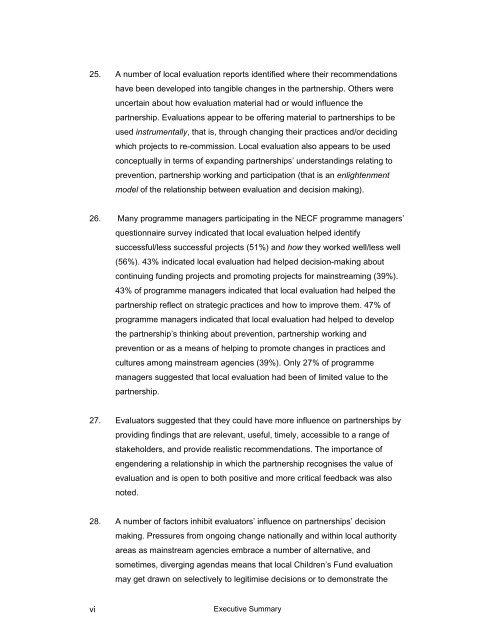Local Evaluation of Children's Services Learning from the Children's ...
Local Evaluation of Children's Services Learning from the Children's ...
Local Evaluation of Children's Services Learning from the Children's ...
- No tags were found...
You also want an ePaper? Increase the reach of your titles
YUMPU automatically turns print PDFs into web optimized ePapers that Google loves.
25. A number <strong>of</strong> local evaluation reports identified where <strong>the</strong>ir recommendationshave been developed into tangible changes in <strong>the</strong> partnership. O<strong>the</strong>rs wereuncertain about how evaluation material had or would influence <strong>the</strong>partnership. <strong>Evaluation</strong>s appear to be <strong>of</strong>fering material to partnerships to beused instrumentally, that is, through changing <strong>the</strong>ir practices and/or decidingwhich projects to re-commission. <strong>Local</strong> evaluation also appears to be usedconceptually in terms <strong>of</strong> expanding partnerships’ understandings relating toprevention, partnership working and participation (that is an enlightenmentmodel <strong>of</strong> <strong>the</strong> relationship between evaluation and decision making).26. Many programme managers participating in <strong>the</strong> NECF programme managers’questionnaire survey indicated that local evaluation helped identifysuccessful/less successful projects (51%) and how <strong>the</strong>y worked well/less well(56%). 43% indicated local evaluation had helped decision-making aboutcontinuing funding projects and promoting projects for mainstreaming (39%).43% <strong>of</strong> programme managers indicated that local evaluation had helped <strong>the</strong>partnership reflect on strategic practices and how to improve <strong>the</strong>m. 47% <strong>of</strong>programme managers indicated that local evaluation had helped to develop<strong>the</strong> partnership’s thinking about prevention, partnership working andprevention or as a means <strong>of</strong> helping to promote changes in practices andcultures among mainstream agencies (39%). Only 27% <strong>of</strong> programmemanagers suggested that local evaluation had been <strong>of</strong> limited value to <strong>the</strong>partnership.27. Evaluators suggested that <strong>the</strong>y could have more influence on partnerships byproviding findings that are relevant, useful, timely, accessible to a range <strong>of</strong>stakeholders, and provide realistic recommendations. The importance <strong>of</strong>engendering a relationship in which <strong>the</strong> partnership recognises <strong>the</strong> value <strong>of</strong>evaluation and is open to both positive and more critical feedback was alsonoted.28. A number <strong>of</strong> factors inhibit evaluators’ influence on partnerships’ decisionmaking. Pressures <strong>from</strong> ongoing change nationally and within local authorityareas as mainstream agencies embrace a number <strong>of</strong> alternative, andsometimes, diverging agendas means that local Children’s Fund evaluationmay get drawn on selectively to legitimise decisions or to demonstrate <strong>the</strong>viExecutive Summary
















